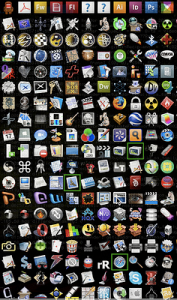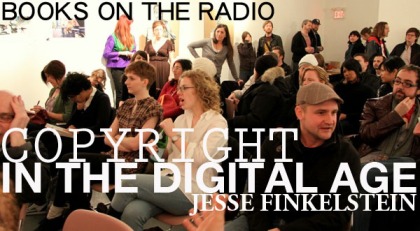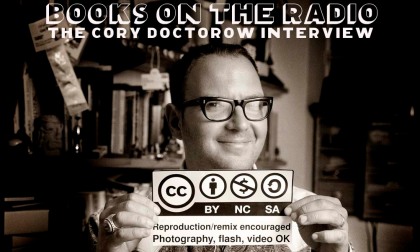Filed under: Copyright, Creative Commons, DRM, Imagination, Interview | Tags: Copyright, Cory Doctorow, Digital Rights Management, DRM, For the Win, Interview
I recently had a chance to hook up with Cory Doctorow again via skype for a quick 37 minute interview about all kinds of interesting things.
Click here for the audio edit of our skype interview.
He’s on tour for his new book, For the Win, and was in Toronto and environs doing publicity ahead of an event at the Merrill Collection.
In this wide-ranging talk we cover quite a lot of ground.
I start off by asking Cory about his new Print on Demand (POD) project that he’s been documenting for Publisher’s Weekly that’s called With a Little Help.
What I love about this project is that Cory is leading from the front.
He’s seen the opportunity to put some real numbers behind a POD project, has laid his process bare and is experimenting with a number of price points for fans and consumers.
Anyone interested in self-publishing or Print on Demand needs to know more about this project.
From there we discuss his new book, specifically the idea of ‘gold farming’, which, very generally, is the act of gamers in 3rd world countries working their way thru complex gaming levels and amassing treasure, loot or gold which they then sell to 3rd parties who then sell it on to others.
Sounds ridiculous, right? Sounds like something out of a science fiction story, right?
Except that it’s real. A weird new kind of colonialism, or a virtual sweatshop.
This leads us to discuss ‘Benevolent Dictators’, hackable devices, technical vs information challenges before moving on to discuss DRM, digital locks and possible consequences of the proposed new Canadian copyright legislation contained in Bill C32.
The conversation ends with Cory offering some advice to young creators – digital natives – who may be confused by the current discussions of ‘piracy’, DRM, windowing, POD.
Some very interesting insights on creative strategy, partnerships.
What do you think about the ideas that Cory expresses in this interview?
Filed under: Copyright, Creative Commons, DRM, Enthusiasms, Imagination, Industry Change | Tags: Copyright

It's because of home taping that we no longer have music. Let's not make the same mistake with books. (Photo by Martin Conway)
This Week in Copyright
This week is the all copyright, file-sharing, DRM week from hell with a sick kitty thrown in (not literally thrown in, ‘course) for good measure.
On Thursday the Canadian Government is set to introduce a new bill that will seek to address and update our copyright law.
Then on Friday I’ll be interviewing Cory Doctorow via skype from Toronto where he’ll be touring his new book, For the Win.
Then on Saturday I’ll be skyping in to Bookcamp Halifax to present a session called Simplicity and Control: Digital Potential Beyond DRM.
So, it’s a watershed week where we determine whether law, behavior and the digital landscape can coexist without litigation and acrimony.
Smart money says not a fricking chance.
*
First Things First.
We’re going to get a new copyright bill in Canada one way or another and really, why not? Let’s just get it done and move on.
There’s been a lot of windmill jousting on all sides of the debate – thank god that analogy is in the public domain! – and I agree that it’s time for our elected representatives to put up or shut up on this.
It’s not a stretch to suggest that a lot of the pressure for this new bill to be introduced in Canada is coming from foreign politicians and from companies who desire to have their content and oil-based distribution chains protected from digital incursion.
That does not make these companies or the politicians “evil”: it makes them companies and politicians.
It is what it is.
The new bill is certainly not being put forward after a deafening hew and cry from creators in this country, though admittedly most will welcome it if only to know where they stand.
And, of course, everybody needs money: countries need money, political parties need money, creators need money, executives need money, we all need money.
I think that it’s obvious that companies with huge amounts of money invested in licensed creativity, content, product, etc… will naturally try to exert as much pressure as possible in order to protect and monetize their assets to their maximum ability. Many of the creators in their ‘stable’ expect no less.
All of this is understood just as it’s understood that ability and willingness to change and adapt to new business models is very very low on the priority list.
Politicians want to stay in office and donations help to fund election campaigns. Investments, locally or federally, from big companies or other countries help to make our politicians look good, to grease the economic gears, maybe create some jobs.
These kinds of influences and relationships have occurred since before the invention of fire.
Content creators/licensees want to protect their abilities to maximize their return on investment. Politicians want to stay in power and also want to be able to fund their next election campaign.
Those are some of the fundamentals.
*
P2P Filesharing & Bit Torrent: A Digital Apocalypse or a Huge Opportunity?
The problem is this: creative content is worth something to the creator, the licensee, the fan and everyone else in the ecosystem that facilitates taking the product from creator’s mind to audience.
Digital innovations have created an opportunity for files – potentially carrying creative work whose copyright provisions do not allow for any kind of non-monetized electronic dissemination – to be transmitted quickly and efficiently all over the world.
P2P File Sharing Networks and Bit Torrent technologies are the most efficient distribution system we have invented for getting information – digital files containing anything from scans of a shopping list, to Shakespeare’s sonnets, to a photo of your mom in front of the Louvre, to leaks of patent pending inventions, published unpublished and unpublishable novels, songs, your wedding photographs, etc… – from one computer to other computers quickly and practically instantaneously.
Fortunately or unfortunately these tools for sharing files and data don’t care what those shared files contain. To them it’s all just information to be transferred.
Hurt Locker or Ishtar are the equivalent of Lady Gaga, a photo of a llama, episode 3 of Rock of Love Season 2, an excel file, a scan of a Mark Danielewski novel, Twilight, whatever. It all has the same basic value.
That value is zero.
* (The zero value is based on the file itself – infinitely replicable and basically indistinct for others – and not the work that went into what the file contains. The value of creation, editorial, design, etc… is invaluable. Unfortunately, these super efficient distribution tools are not designed to monetize in a way that we traditionally link to these kinds of exchanges.)
If you wrap your digital content in a protective layer – DRM – it is easily hacked open and shared regardless.
Even though there no evidence to support the notion that downloading digital content from P2P sites equals a lost sale or in any way negatively impacts revenues for content creators or licensees that does not prevent the appearance of a general assumption that something has been lost, taken, stolen or pirated that should have been rightfully monetized.
As though the 100,000 people (random figure, possibly too low) who have downloaded and watched Iron Man 2 from a practically infinite number of torrent sites around the world would have otherwise paid money to see that movie.
Surely there’s at least a ghost of logic to that statement, right? But can we monetize based on the ghosts of logic?
Probably not.
So… to distill it down to an essence: people are experiencing kinds of content all over the world for free. This content is being acquired via P2P file sharing sites and is being seeded and further leeched by others around the world via an impossible to track bit of perfectly legal software called Bit Torrent.
Though this content is being experienced and shared by many more people than would otherwise have experienced and shared it previously this is a problem because there’s a perceived loss of revenue attached to this file sharing behavior.
The monopolized traditional distribution chain has been subverted and the digital efficiencies are built on the same logic that brought us the “genius” of the Amazon personalized algorhythm and effectively destroyed north American independent bookstore culture but is now wreaking havoc a little further up the food chain.
Rather than see this technological development as an opportunity to develop new ways of communicating, collaborating, community building and discovering new markets through innovation and imagination our government has decided that we need to legislate protections around ineffectual digital locks.
Digital locks that even the very politicians in our ruling minority federal government admit they broken many times in the average use of their iPods and PVRs.
Digital locks that have never worked, that don’t work even for well-meaning citizens but that will potentially criminalize them regardless.
*
My Proposal to End the Copyright Debate:
Like most of my favorite ideas this one is overly simplistic, possibly idealistic and probably impossible.
But here goes:
Copyright holders should lock up their content to the maximum limit if they want to.This is not mandatory, it is a conscious choice.
If copyright holders want to deprive their readers of the ability to widely share the content that they purchased or to transfer the same content between devices or whatever, that is their right.
And if the readership doesn’t like it, well then they can choose from some of the super-abundant alternative content available that doesn’t possess those same law bound restrictions.
Lock it up and throw away the key, maximize that revenue. It’s what copyright is all about, right?
The locks on this content should also not be broken and the content should not be shared on the P2P sites.
Just let it sell from the standard online channels. Peddle it from websites and Amazon and iBooks, wherever.
If, however, you understand and are excited by the potential of these P2P sites for all of the digital benefits that they possess and you’re inclined to use other technologies like POD, paypal, skype, social media platforms, mixing tools, Adobe/Apple content creation software to augment your own stories, products or non-fiction writing then you should make that known and freely embrace the potential.
The traditional methods – paper books, vinyl records, prints, dvds, etc… – will continue to support, augment and quantify the work.
That’s it. It’s that simple.
By taking control of the means of dissemination to build your audience, to collaborate and cross-pollinate media, to explore potentials for new markets and to reach those markets with real product you control your ability to do some really original work and to find ways to get paid that your audience agrees with.
So, pass a law if you want to. But it won’t take long before it becomes insignificant and/or irrelevant as the true creators of the present and the future go to the places that give them the maximum freedom to create and collaborate with the maximum audience and influences.
Taking ‘copyrighted’ content away from the networks won’t stop that it will only serve to create a whole other self-sustaining market based on concepts of creation, sharing, remixing that are outside our common notion of copyright.
And that’s ok.
There is nothing wrong with the traditional model and how it has helped create our current notion of what copyright is and how we should protect it.
But that notion of copyright no longer has exclusive rights to reality.
Filed under: Copyright, DRM, Imagination | Tags: Copyright, Home Taping, Mark Bertils
Via Mark Bertils & Benjamin Laird.
Filed under: Copyright, DRM, Industry Change | Tags: Books on the Radio, Copyright, Digital Rights Management, Douglas & McIntyre, Jesse Finkelstein
Click Here to Listen to Jesse Finkelstein & Sean Cranbury Talk Copyright
At the beginning of February 2010, just before the Olympics rolled into town and before the independent literary showcase W2 Real Vancouver Writers’ Series took root in the local imagination, I was invited to speak on Copyright in the Digital Age to the Masters of Publishing class at SFU.
In preparation for that talk at SFU I spoke to an expert in the field of book publishing, copyright, international rights contracts by the name of Jesse Finkelstein.
Jesse is the Digital Assets and Foreign Rights Director at Douglas & McIntyre, Greystone Books and New Society Publishers. She leads the company’s digital publishing initiatives and the development of international rights sales for all three imprints.
Jesse was formerly an Associate Publisher at Raincoast Books as well as the Everything-That-Needs-Doing Person at Vehicule Press in Montreal. She is a graduate of McGill University as well as Simon Fraser’s Masters of Publishing program.
Over the past year I have had the pleasure of getting to know Jesse. We have had a few great, passionate conversations about rights, the digital wave and the adaptability of traditional publishing business models to fit new demands.
It was a real honour to have Jesse on the show and I think that you’ll agree that it’s a fascinating conversation.
And, even at 30 minutes, it’s way too short.
Please comment below with any thoughts, ideas or questions that you have about these issues or our conversation.
Thanks, Jesse!
Filed under: Copyright, DRM, Industry Change, Pricing | Tags: Amazon, Book Publishing, Dan Brown, Digital Books, Digital download, Digital Rights Management, DRM, eBook, ebooks, File Sharing, Free Content, Harry Potter, P2P, Piracy, Publisher's Weekly, PW, S&S, Scholastic Books, Simon and Schuster, Stephen King, The Lost Symbol, Under the Dome

UPDATE: This post has been refreshed from its original state. That’s what I get for taking Publisher’s Weekly at its word.
Anyway, mid-way through this piece I ask readers to suspend their disbelief – difficult to do when reading a post on book publishing, pricing and digital content, I know – and follow my argument as I use the information from the Publisher’s Weekly column slightly out of context but not entirely out of the realm of possibility.
Mark Coker from Smashwords.com lends useful insight via this Huffington Post piece. Follow the hashtag #publishersmatter on Twitter.
Please add any comments that you think are helpful.
***
Interesting piece from Publisher’s Weekly about Simon and Schuster’s decision to delay the release of the eBook version of Stephen King’s massive new novel, Under the Dome.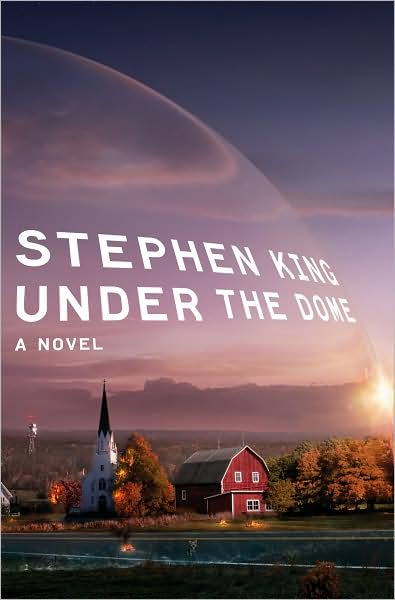
Apparently S&S will be releasing the 1000+ page novel on November 10th and then dropping the ebook on the market on December 24th. Timing is everything, I guess.
The Publisher’s Weekly piece also notes that the S&S will be charging $35 for the eBook, however some further research conducted at StephenKing.com indicates that the ebook will sell for standard Kindle-pricing.
Mr King asks his readers not to “believe the press reports that the e-book reader price for Under the Dome will be $35. This was the result of confusion from a press release from the publisher… It is true that you cannot order the book as an e-download until December 24th, but the physical book, which is a beautiful thing, you can pre-order for less than $9–so who’s better than us?”
So, pricing right? It’s all up in the air. Nobody knows what anything is worth whether it’s a brand spankin’ new hardcover or an infinitely replicable digital file. Are they both worth $9? Really? Are publishers seriously asking the public to swallow that crock?
But they’re trapped between the ruthless capitalism of dominant retailers at war with each other and the ruthless efficiency of the digital age.
***
Let’s say for example that the Great Book Pricing War of 2009 wasn’t happening and skewing this argument beyond proportion and let’s say that S&S thought that $35 for a hard cover was a fair price – which it is – and that $35 for an eBook was also a fair price – which is arguable to say the least.
I float this scenario forward for your consideration because I have heard book publishers say the very same thing – that a digital file should be priced at the same level as the physical product.
To me this notion of equal pricing for physical/digital looks more like a series of test balloons designed to reinforce industry fears than skillful marketing strategies for new books by some of English language’s most beloved authors.
Who gave the final OK on that pricing strategy and where is he/she getting their information?
It’s well documented that the last Harry Potter book – itself a hefty tome – was pirated and disseminated almost immediately upon release (in fact, an in-house perp at Scholastic did the job even before the book hit the shelves) and surely the people at Simon and Schuster are aware that this will happen here, too. I expect that this book will be seeded widely within 24 hours of officially going on sale.
I have documented the bibliographic zeal that Stephen King’s fans show toward his work online in my presentations on DRM and Free Content. I expect that a great majority will look at the cost of $35 for the hard cover version as a fair price to pay – and indeed many of the people who use P2P/torrent sites to download and share Stephen King’s books are dedicated enough to purchase the physical copy – and will see the same price for a digital file as incomprehensibly expensive.
This will certainly bear watching. I have to believe that this is some kind of Big Author Test of Current Market Conditions rather than a strategy that S&S expects to trot out for every new hard cover release.
Dan Brown’s The Lost Symbol showed us something about this new digital/print landscape and the new Stephen King promises to yield even more data even if it seems that it will come at the expense of common sense.
But one must keep an open mind. Hopefully this publishing event will show us something new.
Filed under: BookCamp Vancouver 2009, Copyright, Creative Commons, DRM, Industry Change, Pricing | Tags: Book Sales, BookCamp Vancouver, Books, Brian O'Leary, Digital Rights Management, DRM, File Sharing, Frankfurt Book Fair, Free Content, Magellan Media Partners, O'Reilly Media, O'Reilly Tools of Change for Publishers, P2P, Piracy
Filed under: Copyright, Creative Commons, DRM, Enthusiasms, Imagination, Industry Change, Pricing | Tags: Andrew Savikas, Chris Anderson, Free, Free Content, Scribd, Spiegel Online, Wired Magazine, Wired.com
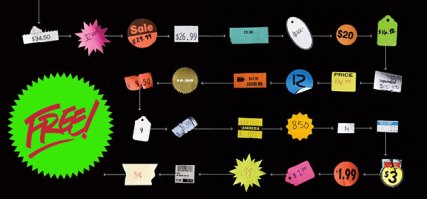
The first time that I read Chris Anderson’s new book “Free” was on a website called Scribd. The book had just been released and Scribd was (and still is) allowing readers to check out the book’s entire content for free: so long as you’re not trying to read the book for free from Canada. That kind of cross-border digital experience is strictly forbidden.
Didn’t bother me much. I wasn’t paying for it so I couldn’t really argue but I’ve been following some of the conversations and interviews that Mr Anderson has been doing online over the past month and I thought that I’d share a few links that I think are interesting.
The first link will take you to the lengthy article at Wired.com that forms the basic argument for his book, Free. The article is called “Free! Why $0.00 Is the Future of Business.”
And then there’s a very interesting interview that he did with Der Spiegel Online about the demise of print journalism, traditional media and the inability of old terminology to adequately describe new realities.
The interview is called “Maybe Media Will Be a Hobby Rather Than a Job” which is a mis-quote from something that Anderson said during the interview. It sounds juicier when taken out of context.
The interview ends with this nifty little exchange in italics below. I think it’s a lucid distillation of the issues that journalism, traditional media and the publishing industry are facing now.
SPIEGEL: Conclusion: There is no convincing solution so far — even from provocateurs like yourself?
Anderson: I think we will discover that whatever the business model of the 20th century was, it will be different in the 21st. Maybe we realize that selling ads is not the business we’re in. Maybe we’re into selling online content to audiences, or in creating communities or into selling events — in a similar way to which parts of the music industry is making money from concerts. Maybe companies that were built around the old business model will go away and other companies will come up, in much the same way as old record industry labels may disappear but the Apples of the world, with their iPods and iPhones, will continue to do well.
SPIEGEL: One last thing, why isn’t your book free?
Anderson: You only pay for the hardcover version. The marginal cost for the digital file is zero, so I’ll give the digital text and the audio files away for free. However, if you want to have the abridged audio book in a 3-hour-version, then you’ll have to pay.
SPIEGEL: Because time is money?
Anderson: Exactly.
* I have added this last bit to the conversation that Michael Tamblyn and I had over at the ShortCoversBlog and have updated my earlier post about eBooks pricing. Note Anderson’s mention of ‘marginal cost’ for a digital file – it would appear that Scribd is still offering Free for free on their site but Amazon US has it for $19.99 ($9.99 for the Kindle edition) and ShortCovers has it on their site for $9.99 ($11.99 CDN). The devil is in the details as always.
** By the way, I was tipped to a lot of this by Andrew Savikas who wrote about it here. If you’re not familiar with Andrew’s work please take the time to read through his site especially his piece, Content is a Service Business. Compulsory reading.
Filed under: Copyright, Creative Commons, DRM, Enthusiasms, Industry Change, Kindle | Tags: Amazon, Green Apple Books, Kindle, Mocking, More mocking, Orwell
Green Apple Books in San Francisco has put together two great videos playing old school books against the Amazon Kindle.
In case you’re wondering what amazing tactile – not to mention tethered – experiences the Amazon Kindle offers please check these videos for details.
Many posts on this blog advocate embracing new digital technologies and occasionally mock publishers for dragging their feet in adopting these new technologies and not making books available digitally for their customers. Yes, I am the same guy who writes those posts, too, but recognize this: I am not in favour of brutal, clunky, exclusive, non-customer friendly technologies that cost $400 USD and don’t actually allow you to own the content that you pay for – see Kindle vs George Orwell’s 1984 for more details. That is something that’s too ridiculous to consider.
I believe in digital dissemination and ease of use for ebooks via things like the iPhone and/or whatever technology that is inclusive and open as opposed to exclusive and tethered, but I also believe that the digital revolution in publishing is only going to make publishers make better books and more money.
I’m happy to see the guys at Green Apple Books rightfully mocking the Amazon Kindle.


